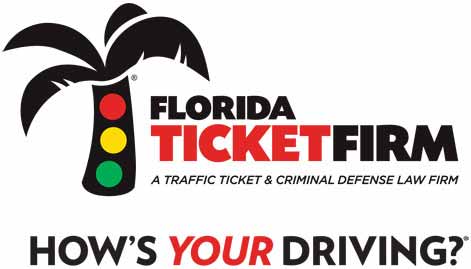
At the start of 2024, the State of Florida expanded regulations for its “move over” law. This statute encourages motorists to exercise extra care when vehicles are on the side of the road or when emergency vehicles must pass.
While these rules intend to increase road safety, they also add another reason for police to ticket drivers, perhaps unfairly at times. Of course, everyone should try to obey the Florida move over law, but if you get a ticket for this infraction, you can fight it with help from our team at Florida Ticket Firm.
Why Is There a Florida Move Over Law?
All 50 states have move over laws. Their primary purpose is to protect the safety of first responders who do important work serving their communities, and Florida follows this pattern.
Move over laws mandate that other travelers get out of the way while emergency vehicles hurry to attend to an incident. Stopping along the roadside gives first responders clear passage to save lives and limits the odds of another accident.
Move over laws also set restrictions on how drivers pass an official vehicle that has pulled over to the side of the road. Most often, this applies to police officers who are carrying out a traffic stop or assisting motorists.
Florida has been publishing data on drivers and its move over law for the years since 2015. This information shows that drivers not moving over has led to over 1,700 crashes, 128 serious injuries, and eight deaths. For this reason, the state expanded the Florida traffic laws with additional guidelines on moving over for stopped vehicles.
What Is the Move Over Law in Florida?
You can find the official reading of the Florida move over law in Chapter 316.126 of the state’s statutes. Here is a simple breakdown of that information.
The General Guidelines
The first element of the move over law in Florida is for drivers to stop as close as possible to the edge of the roadway when emergency vehicles give audible or visible signals to respond to an incident. Drivers should stop parallel to the road and stay clear of any intersection until the emergency vehicle has passed.
The second part of the law tells drivers to move over or slow down when another driver has stopped on the side of the road. Originally, the law only applied to emergency and law enforcement vehicles. In 2014, Florida expanded the law to include municipal, utility service, and sanitation vehicles, as well as tow trucks.
The newest rules took effect in 2024 and require drivers to move over for any vehicle that has stopped on the roadside. Therefore, someone who does not move over or slow down for a passenger vehicle could get a ticket for breaking Florida’s move over law.
Rules for Multi-Lane Roads
On highways with multiple lanes, you should change lanes to move away from where the stopped vehicle is as soon as you can safely do so. If you cannot change lanes safely, you should never stop in the middle of the road and wait to change lanes. Instead, you would treat the situation as if you were on a two-lane road.
Rules for Two-Lane Roads
On two-lane roads, it is obviously unsafe to move over into the lane for oncoming traffic. In this case, the law requires you to slow down to 20 mph below the posted speed limit. If the speed limit is 20 mph or lower, you must decelerate to 5 mph and proceed cautiously past the stopped vehicle.
The only exception to either of these rules is if an emergency worker is on the scene guiding traffic and directs you to do otherwise.
What Are the Consequences for Not Following These Florida Traffic Laws?
Not obeying the Florida move over law leads to legal and other consequences.
Fines and Points
The fine for not obeying Florida’s move over law usually goes up to $158. However, certain circumstances can push this to $500, such as when a driver does not lower the vehicle’s speed in a school zone.
A driver can also get three points on a license for this infraction. Keep in mind that 12 points within 12 months leads to a 30-day suspension.
Insurance Increases
Insurance companies view drivers with violations as a greater risk and increase premiums accordingly. Value Penguin did research and found that three points could increase rates by up to 23%, while four points caused an insurance increase of up to 44%.
Lost Time Dealing with Ticket
The long-term consequences often make fighting a ticket worth it. However, you’ll have to build a strong defense that convinces the judge to drop or reduce the charges.
Doing this can require two court appearances, which is time away from work or other responsibilities. If you don’t get a favorable outcome, you may have sacrificed that time for no gain.
What Are Possible Defenses for Not Following Florida’s Move Over Laws?
A few defenses for fighting a ticket pertaining to Florida’s move over law include:
- Avoiding an unsafe situation: You had to evade a dangerous scenario.
- Getting insufficient notice from emergency vehicles: The official vehicle did not turn on lights or sirens soon enough for you to see or hear and get out of the way.
- Challenging evidence of speeding or disobeying: The officer’s perception or evidence of what happened is incorrect.
- Finding errors on the ticket or by the officer: A mistake or processing error on your citation invalidates the case.
Presenting a convincing argument can be challenging. Even when you’re right, the other side could beat you on a technicality. That’s why you should consider getting the help of legal counsel when fighting your ticket.
How Can You Fight a Ticket for Florida’s Move Over Law?
The updated Florida Move Over law will hopefully help roads become safer. Still, the new guidelines could lead unsuspecting drivers to face strict penalties.
If an officer gave you a ticket for allegedly not following Florida’s move over law, you don’t necessarily have to pay the fine and accept the penalties. Contact us at Florida Ticket Firm to find out how we can fight your ticket to protect your driving record and save you time.

